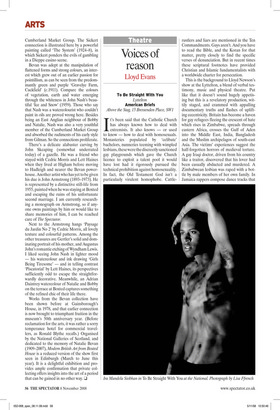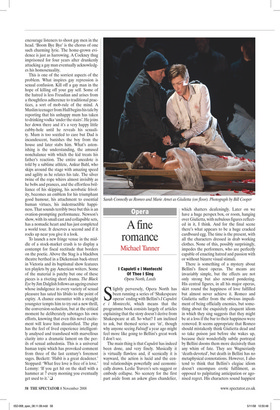Voices of reason
Lloyd Evans
To Be Straight With You Lyttelton American Briefs Above the Stag, 15 Bressenden Place, SW1
It’s been said that the Catholic Church has always known how to deal with extremists. It also knows — or used to know — how to deal with homosexuals. Monasteries populated by ‘celibate’ bachelors, nunneries teeming with wimpled lesbians, these were the discreetly sanctioned gay playgrounds which gave the Church licence to exploit a talent pool it would have lost had it rigorously pursued the technical prohibition against homosexuality. In fact, the Old Testament God isn’t a particularly virulent homophobe. Cattle rustlers and liars are mentioned in the Ten Commandments. Gays aren’t. And you have to read the Bible, and the Koran for that matter, pretty closely to find the specific verses of denunciation. But in recent times these scriptural footnotes have provided Christian and Islamic fundamentalists with a worldwide charter for persecution.
This is the background to Lloyd Newson’s show at the Lyttelton, a blend of verbal testimony, music and physical theatre. Put like that it doesn’t sound hugely appetising but this is a revelatory production, wittily staged, and crammed with appalling documentary truths and flashes of uplifting eccentricity. Britain has become a haven for gay refugees fleeing the crescent of hate which rises in Zimbabwe, spreads through eastern Africa, crosses the Gulf of Aden into the Middle East, India, Bangladesh and the Muslim archipelagos of south-east Asia. The victims’ experiences suggest the half-forgotten horrors of medieval torture. A gay Iraqi doctor, driven from his country like a traitor, discovered that his lover had been casually abducted and murdered. A Zimbabwean lesbian was raped with a bottle by male members of her own family. In Jamaica rappers compose dance tracks that encourage listeners to shoot gay men in the head. ‘Boom Bye Bye’ is the chorus of one such charming lyric. The home-grown evidence is just as harrowing. A Cockney thug imprisoned for four years after drunkenly attacking a gay man eventually acknowledges his homosexuality.
This is one of the sorriest aspects of the problem. What inspires gay repression is sexual confusion. Kill off a gay man in the hope of killing off your gay self. Some of the hatred is less Freudian and arises from a thoughtless adherence to traditional practices, a sort of mob-rule of the mind. A Muslim teenager from Hull begins his tale by reporting that his unhappy mum has taken to drinking vodka ‘under the stairs’. He joins her down there and it’s a very happy little cubby-hole until he reveals his sexuality. Mum is too sozzled to care but Dad is incandescent, banishes the boy from the house and later stabs him. What’s astonishing is the understanding, the amused nonchalance with which the kid treats his father’s reaction. The entire anecdote is told by a sublime athlete, Ankur Bahl, who skips around the stage with amazing speed and agility as he relates his tale. The silver twine of the rope whirrs almost invisibly as he bobs and prances, and the effortless brilliance of his skipping, his acrobatic frivolity, becomes an emblem for his triumphant good humour, his attachment to essential human virtues, his indestructible happiness. That sounds terribly twee but this is an ovation-prompting performance. Newson’s show, with its small cast and collapsible sets, has a nomadic heart and has just completed a world tour. It deserves a second and if it rocks up near you give it a look.
To launch a new fringe venue in the middle of a stock-market crash is to display a contempt for fiscal rectitude that borders on the poetic. Above the Stag is a blackbox theatre berthed in a Dickensian back-street in Victoria and its baptismal show features ten playlets by gay American writers. Some of the material is patchy but one of these pieces is a riveting short drama. The Black Eye by Jim Dalglish follows an ageing cruiser whose indulgence in every variety of sexual pleasure has sated his libido to the point of expiry. A chance encounter with a straight youngster tempts him to try out a new thrill, the conversion-seduction, but at the critical moment he deliberately sabotages his own efforts, knowing that even this novel excitement will leave him dissatisfied. The play has the feel of lived experience intelligently analysed and transfused with marvellous clarity into a dramatic lament on the perils of sexual anhedonia. This is a universal human topic which has provoked comment from three of the last century’s foremost sages. Beckett: ‘Habit is a great deadener.’ Stoppard: ‘What free love is free of is love.’ Lemmy: ‘If you get hit on the skull with a hammer at 7 every morning you eventually get used to it.’ ❑



















































































 Previous page
Previous page